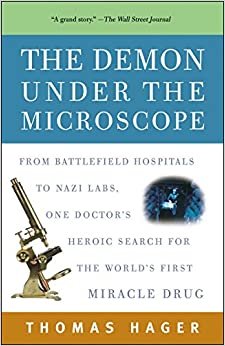
Now I know that non-fiction science books are quite a niche genre of books to be gaga over but this book is a prime example of why you should give it a try if you've never ventured down this road before. It turned out to be an excellent recommendation because it was SO. I can't remember how I came to add this to my TRL but I have a feeling it was a recommended read on StoryGraph. Anyone interested in the history of modern medicine/science or even science during WWII would likely enjoy this book. The book also describes how the high demand for sulfa drugs led to tragedy and strengthening of the FDA in the US. The perils and pitfalls of "wonder drugs" are clearly described. The author puts Domagk's discovery into the broader perspective of WWII and the post-war era. The main actors are well researched and really seem to come alive, especially during descriptions of the rivalries and feuds between scientists and labs. Although non-fiction, the book reads like a novel. Modern medications treating many diseases from hypertension to diabetes are derived from sulfa drugs. Although sulfa antibiotics aren't used all that often now, they were the first medications effective against bacteria, the scourge of humankind since the dawn of time. Winner of the 1939 Nobel Prize in Medicine for his work on sulfa antibiotics, Domagk's work has led directly and indirectly to saving the lives of millions. Very interesting book about the work of one of the most important scientists of the 20th century that you've never heard of Gerhard Domagk. This is a fascinating scientific tale with all the excitement and intrigue of a great suspense novel. The very concept that chemicals created in a lab could cure disease revolutionized medicine, taking it from the treatment of symptoms and discomfort to the eradication of the root cause of illness.Ī strange and vibrant story, The Demon Under the Microscope illuminates the colorful characters, corporate strategy, individual idealism, careful planning, lucky breaks, cynicism, heroism, greed, hard work, and the central, though mistaken, idea that brought sulfa to the world.

Sulfa changed the way new drugs were developed, approved and sold transformed the way doctors treated patients and ushered in the era of modern medicine. Sulfa saved millions of lives-among them Winston Churchill and Franklin Delano Roosevelt, Jr.-but its real effects are even more far reaching. In The Demon Under the Microscope Thomas Hager chronicles the dramatic history of the drug that shaped modern medicine. This incredible discovery was sulfa, the first antibiotic medication. It conquered diseases, changed laws, and single-handedly launched the era of antibiotics.


Fast-paced, suspenseful, and utterly satisfying, The Demon Under the Microscope is a sweeping history of the discovery of the first antibiotic and its dramatic effect on the world of medicine and beyond.


 0 kommentar(er)
0 kommentar(er)
